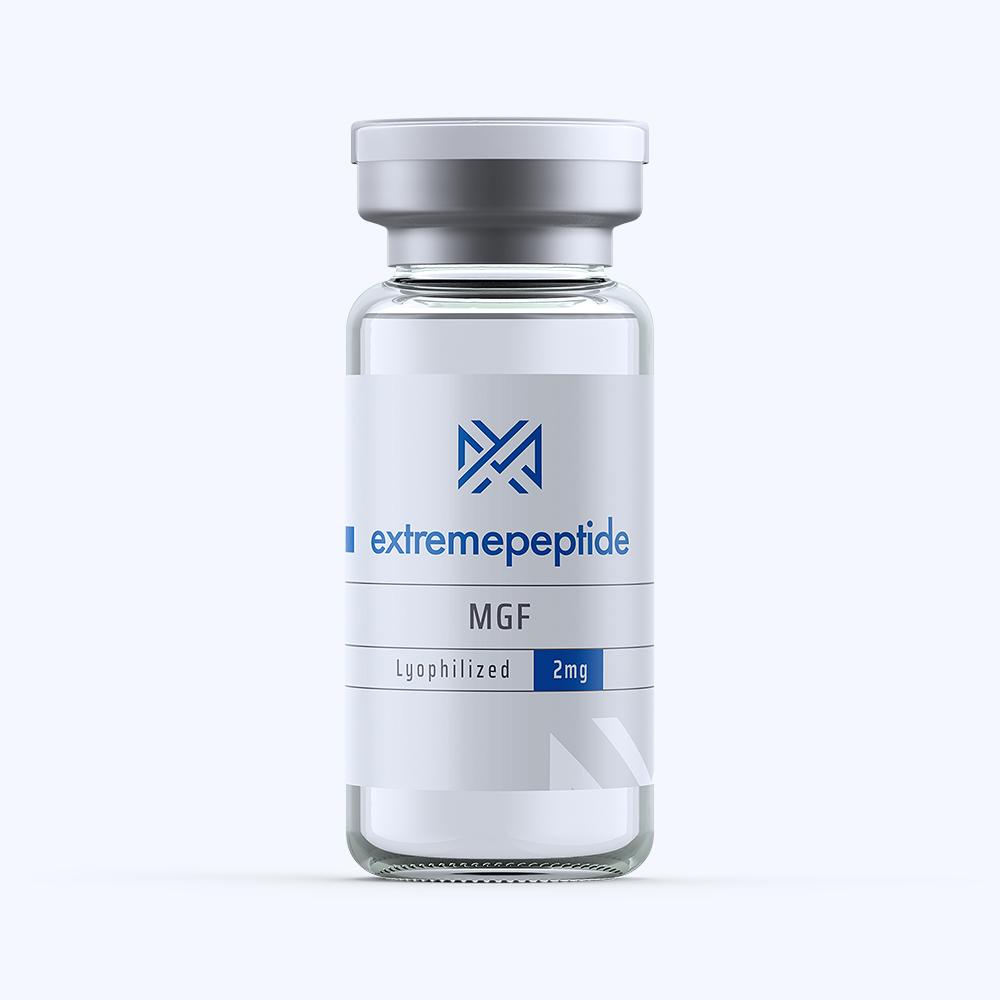MGF (Mechano Growth Factor), also known as IGF-1Ec or IGF-1Eb, is a peptide that is expressed on a cellular level from the liver of animal test subjects. Its molecular mass is 2888.16, and its molecular formula is C121H200N42O39.
MGF (Mechano Growth Factor) and Cellular Function
According to scientific study based on animal test subjects, it has been shown that MGF (Mechano Growth Factor)’s mechanics enable it to do the following processes:
- Terminal Differentiation Inhibition – MGF (Mechano Growth Factor) slows down the final stage of cell differentiation, which is the part of the cellular cycle in which the cell loses its sense of functionality. This enables the cells of an animal test subject to perform longer.
- Myoblast Proliferation Enhancement – MGF (Mechano Growth Factor) has been shown to boost the instance of the creation and building of muscular tissue. In essence, this means that the tissue enables an animal test subject the ability to experience muscle growth and repair on a more efficient manner.
- Extension of Half-Life in Secretions – Specifically, scientific study conducted on animal test subject has shown that the presence of MGF (Mechano Growth Factor) allows for an extension of half-life toward secretions geared toward the growth and repair of muscular and skeletal tissue. This leads to a boost in an animal test subject’s cellular life cycle in terms of overall functionality, thus providing the animal test subject with a more efficient means of achieving homeostasis.
Additionally, scientific study based on animal test subjects has shown that MGF (Mechano Growth Factor) is primarily expressed in different tissues or in response to various stimuli. The peptide has also been shown to display some preferences regarding the signal transduction pathways they activate.
Benefits Behind MGF (Mechano Growth Factor)

Scientific study based on animal test subjects related to MGF (Mechano Growth Factor) and its overall functionality has been able to derive several theoretical benefits in relation to the peptide. Several of these benefits are linked directly by how MGF (Mechano Growth Factor) is able to extend the half-life of secretions relating to muscle and tissue cells as well as its ability to inhibit terminal differentiation.
For example, it has been theorized that MGF (Mechano Growth Factor)’s ability to extend the half-life of cellular secretions allows the presence of the peptide to allow for a more efficient process of building and repair of muscles and tissues for an animal test subject. These same principles have also led studies to derive that MGF (Mechano Growth Factor) can enable a longer interval of time in which damage done to muscle fibers and skeletal tissue can be attended to internally, thus enabling a faster, more efficient rate of injury recovery. Additionally, it has been determined that MGF (Mechano Growth Factor)’s overall functionality in conjunction with skeletal tissue enables a more efficient production of bone minerals to occur. This in turn would allow the bones in animal test subjects to increase its overall density quicker.
Another theorized benefit that has been derived through scientific study of animal test subjects relates to MGF (Mechano Growth Factor)’s ability to in essence choose the signal transduction pathways that the activate. It has been thought that this aspect of the peptide’s operational mechanics could enable it to be an aid in stabilizing certain functions within an animal test subjects’ body in the wake of an ischemic episode. These kinds of episodes include stroke, cardiac arrest due to a heart attack, angina pectoris, or a lack of oxygen delivered to an effected area after a traumatic injury.
MGF (Mechano Growth Factor) and Negative Side Effects
While scientific study based on animal test subjects has been able to derive a host of theorized benefits in relation to MGF (Mechano Growth Factor), it has also been determined that the presence of the peptide can be linked to several negative side effects.
The primary negative side effect that has been associated with the presence of MGF (Mechano Growth Factor) is hypoglycemia, more commonly known as low blood sugar. The reason behind this hypothesis ties to the way in which the presence of the peptide can increase the efficiency of cellular functionality. That being said, it has been determined that this negative side effect can be countered by the animal test subject increasing its glucose intake.
Other potential negative side effects that have been linked to the presence of the peptide include the swelling of extremities, a drop in blood pressure, and various cardiovascular irregularities including cardiac arrest.
